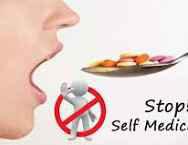
By Florence Adejumo
Self-medication refers to the practice of taking medications or substances without a prescription or medical supervision to treat perceived health issues or alleviate symptoms. This can include:
– Over-the-counter (OTC) medications
– Prescription medications borrowed from others or obtained illegally
-Herbal supplements or alternative therapies
– Alcohol or drugs
The effects of self-medication include:
1 Masking underlying conditions, delaying proper diagnosis and treatment.
2. Drug interactions, allergic reactions, or adverse effects.
3. Dependence, addiction, or withdrawal symptoms.
4. Worsening of symptoms or exacerbation of underlying conditions.
5. Increased risk of overdose or poisoning.
6. Interference with prescribed medications or treatments.
7. Delayed seeking of medical attention, potentially leading to serious health consequences.
Self-medication can also have psychological and social consequences, such as:
1. Reinforcing harmful coping mechanisms.
2. Avoiding underlying emotional or psychological issues.
3. Straining relationships with healthcare providers or loved ones.
